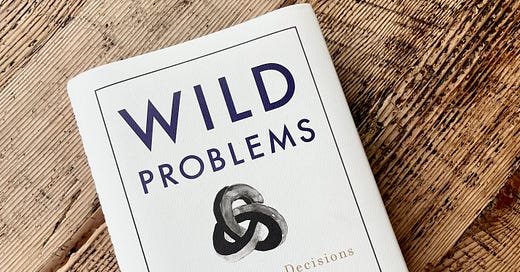How Do You Make a Big Decision?
Data Only Takes You so Far. Reviewing ‘Wild Problems’ by Russ Roberts
Let’s say you want to do one or more of the following: move house, get married, start a business, change careers, join a church, have kids, vote, volunteer. How do you make the right call? We usually start by contemplating the upside, which seems like a decent place to begin. We might then take stock of the downsides to counterbalance an over-rosy picture.
We run these sorts of cost-benefit analyses without much effort, or even conscious awareness. But is it really possible, even if we scrutinize the balance sheet like a team of government auditors, to weigh the pros and cons on getting married, or moving, or launching a business?
It’s true: There are costs and benefits to these decisions. But arguably we don’t—and can’t—know what they are. Even if we can reliably identify potential ups and downs, how do we weigh them against each other? They’re rarely equivalent.

Operating in the Dark
Some problems, such as those above, resist rational decision making. And yet they’re among the most important decisions we ever make. Russ Roberts, an economist and host of the wonderful podcast EconTalk, refers to these and other existential puzzlers as “wild problems.”
In his new book by that title, Roberts tells the story of Charles Darwin seesawing on the marriage question. To assist his decision, Darwin created a table with the positives and negatives in parallel columns. The idea that something so momentous and life-changing could be reduced to something so calculated might strike us as odd, even a little humorous; the television show Friends once played a similar situation for laughs.
But, as Roberts points out, Darwin’s table isn’t merely odd. It doesn’t work. Why?
Darwin the Bachelor can’t really know what life looks like on the other side of marriage. “His list of pluses and minuses—especially the pluses—is the list that someone would make who has never been married and has no access to the upside of the inner life of a married man,” says Roberts. As as result, “Darwin can only pretend to make a rational decision.”
It’s not just marriage. We’re always working in the dark with wild problems. An informed decision presumes knowing how the decision will change us or our circumstances, and huge swaths of that dataset are simply unavailable on the front end. The unknowns outweigh the knowns. And what we do know often proves irrelevant once we’re on the other side of the decision. Just ask anyone ten years after their wedding or having a child.
My wife and I have five children, two biological from my first marriage and three adopted. Our youngest was born at just twenty-seven weeks; the first time I met her, she was barely two pounds. There’s no calculus for knowing how holding a human that tiny will affect you.
Ignorance plagues our decisions because our experience following the decision is what begins flicking the light switches. How will moving, starting a business, worshipping, volunteering, adopting a micro preemie affect you? The discovery is in the doing, not the premeditating.
This leaves us in a bind, doesn’t it? One of Roberts’s followers on Twitter realized the difficulty. “If the important things are hard to measure, and the measurable things misleading,” he asked, “what kind of decision framework is left?”
Six Practical Guidelines
You might think Roberts, an economist trained in the dark arts of his profession, would simply point us back to rational decision making and give us a more robust method—however stilted and otherworldly—to implement. Better calculus. More heuristics and workarounds to compensate for our frailty.
But no. “Formulas are simple,” he says. “That’s a feature, but also a bug. Life is complicated.” Instead of formulas, Roberts points us to some practical guidelines. Here are six I take away from Wild Problems.
1. Focus on flourishing. The first represents a shift in perspective. When we run our cost-benefit analyses we’re trying to optimize our outcomes. But that only works for problems where the all variables are truly known. “The best spouse/partner/career/city doesn’t exist,” says Roberts, “and it’s not just because they’re hard to find. It’s not a meaningful concept.” The point of gardening isn’t yields; it’s growing things.
2. Aspire to the good. If life is about growth, it’s prudent to ensure we grow in healthy directions. “We are in the process of becoming,” says Roberts. “So give some thought as to what you desire to desire.” Author Luke Burgis’s concern about thick and thin desires comes into play here; if our aspirations are shallow and derivative, they won’t aid our flourishing.
3. Practice what you desire. We grow into our hopes, and that means we have to do what we aspire to, even if we’re lousy at the beginning. And of course we are. Jimi Hendrix’s first notes were a far cry from his final. “Practice may not make perfect,” says Roberts, “but it should lead to better.”
4. Privilege your principles. When we have a deep sense of what’s true and beneficial, it’s best to stick with it whatever the outcome. “Don’t make trade-offs when it comes to your essence,” says Roberts. If we find ourselves in situations where compromising our values offers short-term gains but undermines long-term goals, setting some personal rules can help us make the right call when we’re tempted to deviate. “Rules are useful in maintaining who we are,” says Roberts. “But they’re probably even more important in helping us become who we might want to become.”
5. Experiment. Growing, aspiration, practice, conflict in our desires: these all point to the fact that outcomes aren’t predetermined. As the saying goes, we make the way by walking. What happens when the path isn’t clear? “Try stuff,” says Roberts. You don’t know how shoes feel by looking at them.
“Experiments are how we learn everything,” says Margaret Heffernan in Uncharted, an excellent book I discovered on EconTalk and reviewed here. “That life, work, love, politics are complex makes experiments more valuable, not less. They allow us to see the systems we inhabit. Since we can’t see the whole of a complex system at once, trial and error is how we probe them to find out what works.”
As Roberts puts it, “Sometimes being aimless helps you discover where to aim.”
6. Feel free to edit. If experiments reveal what works and what doesn’t, we shouldn’t judge ourselves too harshly for mistakes, nor should we hold onto our failures. “Life choices that turn out differently from what we hoped aren’t mistakes,” he says. “They’re just choices that turned out differently than we hoped.” Treat failure like helpful data, not a final verdict. In the second to last chapter, Roberts suggests we live like artists. “Life is like a book you are writing and reading at the same time,” he says. Feel free to edit the story if it improves the chapter.

If we’re looking for certainty, we’re not going to find it. “Wild problems are not the kinds of problems with answers,” says Roberts. Better to know and deal with that reality than simply hope otherwise.
We face wild problems every day, and the shape our current experience reflects how we’ve decided wild problems in the past. However the story we’re writing reads thus far—with its unique mix of drama, tragedy, and comedy—my guess is the draft should both humble and embolden us. Keep writing.
Thanks for reading. If you’re enjoying Miller’s Book Review 📚 please take a second and share it with a friend!
Not a subscriber? Take a moment and do that as well. It’s free, and I’ll send you my top-ten quotes about books in your welcome email.




Appropriate that it was Darwin who imagined that some such tableau could make deeply human decisions. His cousin, Francis Dalton, took it a step farther and decided that one could use similar methods to evaluate other people’s worth—and thus was eugenics born. Galton, Karl Pearson, Ronald Fisher, and others developed what we know of as mathematical statistics to buttress their ghastly enterprise. (I wrote about it here: https://graboyes.substack.com/p/the-briar-and-the-rose.)
I actually did my Master's work in decision theory back in the early 1980's when behaviorism, cognitive psych and economics were clashing on theories of human motivation and behavior (I was in a behavioral Master's program, concurrently doing PhD work in a different cognitive program which was just getting traction, and was dabbling at an MBA.) It is really interesting how far removed from the concepts of economic rationality, cognition and behaviorism of 40 years ago this is. I've followed "pop psych" on decision making over the decades (everything from Psychology Today to women's magazine articles on how to make good decisions) and have watched a subtle shift from the "Darwinian method" to "gut check method". The fact it "makes perfect sense" is indicative of how our culture has shifted our perceptions of how our own minds work.